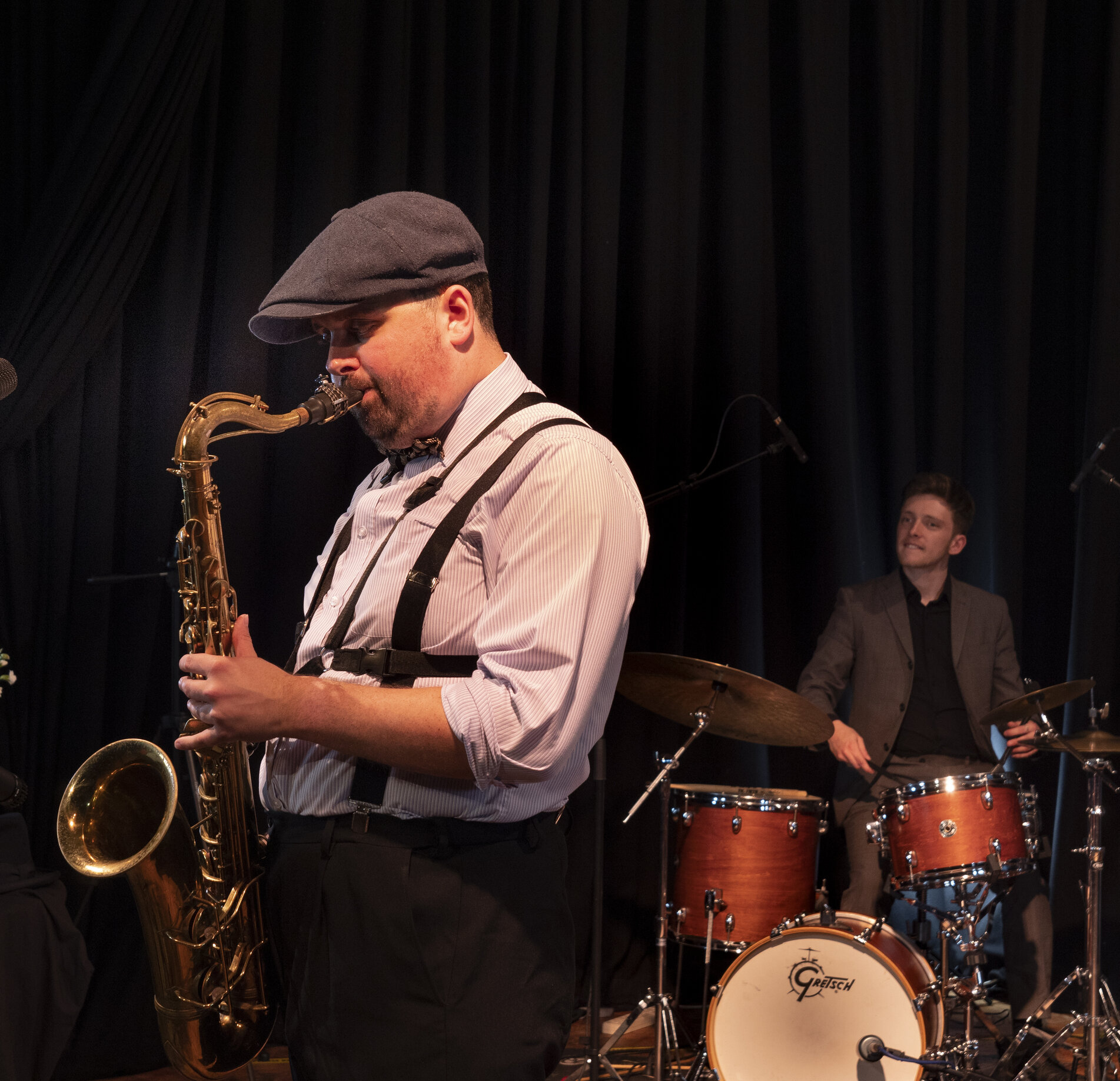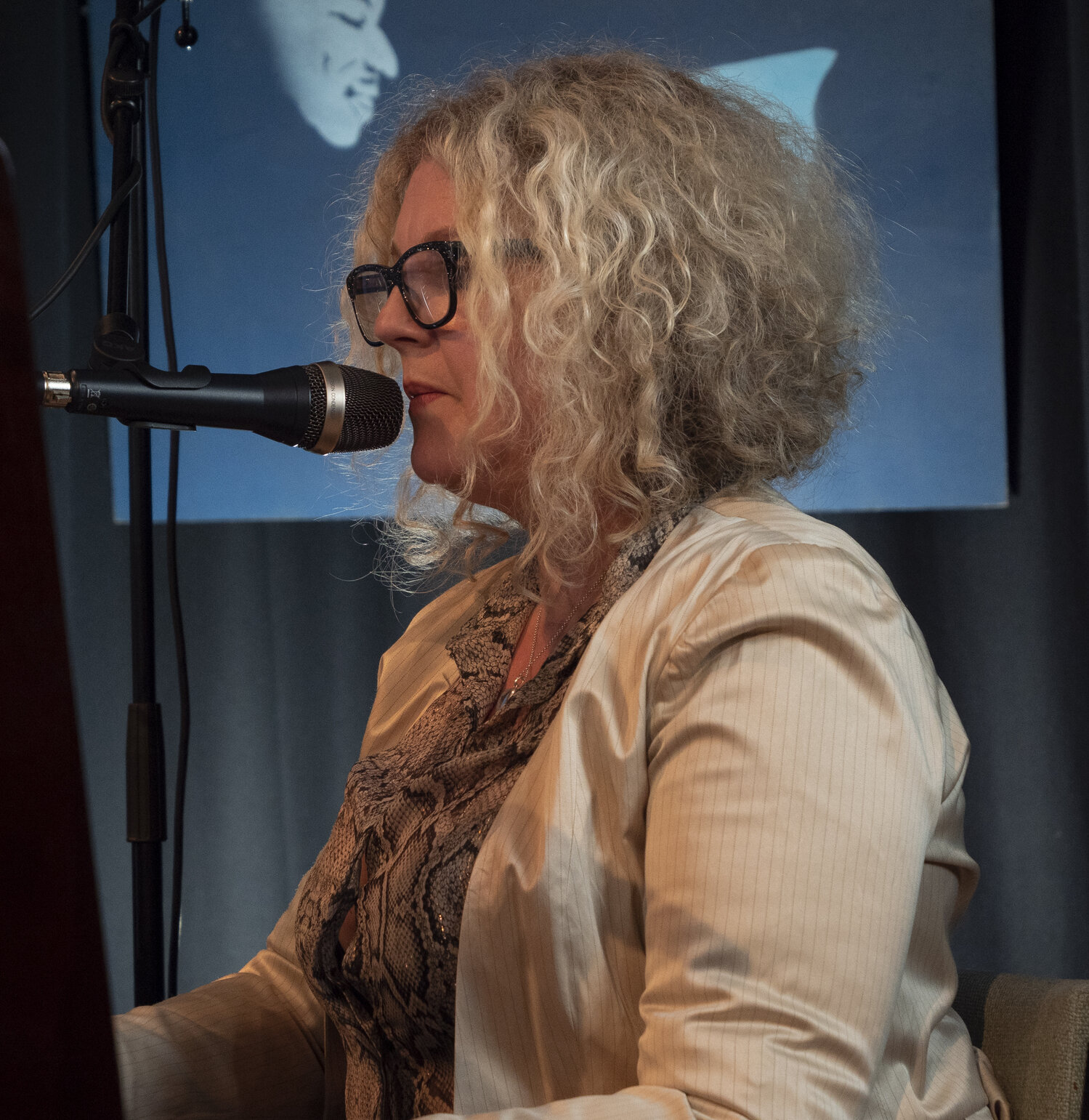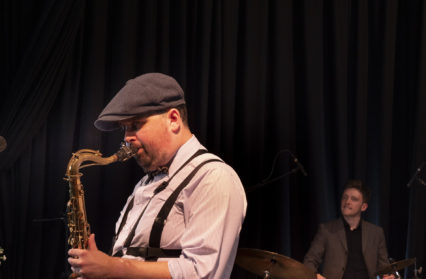Wales continues to help guide UK jazz musicians through the privations of Covid, with Black Mountain Jazz organising its Wall2Wall Festival 2021 for the second year running as a ‘virtual’ event. Nigel Jarrett has been watching, and listening to, the results.
Take a bow Mark Viveash, Sean McGowen, Julian Miles, and Geraint Jones of 47 Studios & Productions. Without their filming of the event, the second virtual Wall2Wall Jazz Festival at Abergavenny wouldn’t have taken place this year with such sure compatibility of sound and vision.
Despite the pandemic, Black Mountain Jazz went ahead with its annual festival in 2020 by contracting Viveash and his team to film musicians in the summer at its Melville Centre base in the town, editing the results with BMJ director Mike Skilton and streaming them as separate videos. Viveash & Co. took on this year’s festival as well.
Last year it was something new for all concerned and judged a success, not least by the jazz musicians themselves, who were paid the fees they would have received had they been playing the standard gig and conditions had been Covid-free. A limited edition CD of the 2020 festival was also made. The same arrangements applied this year. Moreover, four of the five featured acts, filmed like last year in the day, also made evening appearances at a new rural venue in nearby Llanvetherine. These were also filmed and the results grafted on to the main Melville footage as ‘bookends’. Other changes and enhancements included information and photos superimposed on the videos, and the first appearance of the BMJ Collective, a group of musicians – this year a quartet – put together by Skilton and drummer Alex Goodyear to function as a BMJ house band.
In The Journey of Trad (meaning ‘traditional’ rather than 1950s UK Trad jazz) Goodyear outlined jazz history up to 1930s Swing, after which the music became, as he put it, ‘multi-faceted’. The quartet of Goodyear, Jack Mac (also on clarinet and tenor sax), Luke Adams (banjo), and Clem Saynor (acoustic bass), romped through classic and illustrative tracks, including spirituals (‘Down By The Riverside’), Tin Pan Alley (Alexander’s Ragtime Band) and Swing itself (‘It Don’t Mean A Thing’, etc). The band was careful to give these almost hackneyed tunes its best shot, with structured emphasis on Goodyear’s snare to prop up the marching song John Brown’s Body, Adams’s plucked banjo solo on ‘Down By The Riverside’ and elsewhere, and Saynor’s opening and closing bass on the gospel song ‘Wade In The Water’. By the end, despite Mac’s switch from clarinet to tenor, the historical developments demanded different instrumentation, but we got the message.
Mac wasn’t the only vocalist at the festival. In fact, all the bands had one and pianist-singer Wendy Kirkland and her trio had two: herself and guest Annette Gregory. The popular Kirkland’s gig celebrated jazz’s divas. It’s a subject already enshrined in a Kirkland band album (not with Gregory) and acclaimed and toured widely, including at BMJ. Gregory couldn’t have wished to be in better company than Kirkland, whose blessedly two-handed piano style encompasses the sinewy and the delicate and whose singing covers wit (Frishberg-Dorough’s ‘I’m Hip’), laid-back swing (Frank Loesser’s ‘Slow Boat To China’), and tenderness (Bernstein’s ‘Some Other Time’). The gig bowed not only to divas but to landmark interpretations, in this case and respectively, Blossom Dearie, Canadian pianist-singer Carol Welsman, and Diana Krall. Kirkland, here in the watchful company of bassist Pat Sprakes and drummer Steve Wyndham, was a two-pronged jazz power source, her vocal introduction to Peter Nero’s ‘Sunday In New York’ followed by a piano solo that was inspired extension rather than instrumental respite.
Gregory, making similar references back, decided on happy-go-luckiness for ‘April In Paris’ in contrast to the Billie Holiday version. She also had in mind Anita O’Day’s interpretation of ‘That Old Feeling’, Ella Fitzgerald’s of ‘How High The Moon’, and Sarah Vaughan’s of ‘On A Clear Day’. The first began with shuffling brushwork by Wyndham, joined by Sprakes, who a few minutes later delivered the gig’s extended bass solo. But all were Gregory’s own possessions, not least the equivalent determination of Nancy Wilson’s ‘Never Will I Marry’, essayed on the version with alto-saxophonist Cannonball Adderley.

Dom Pipkin, like Kirkland, is a pianist and a singer but from a different street. His style is a fascinating mixture of barrelhouse/boogie, R&B, rock & roll, and modern jazz, all deployed to a single-minded musical purpose alongside Dom’s own take on rollicking vocals. With delinquent bravado, the piano keyboard often absconded cartoon fashion into regions beyond its New Orleans origins; sort of Dr John by Fats Domino out of McCoy Tyner. Add the lively drumming of Jimmy Norden and the depth of long-time Pipkin associate Nick Kacal’s bass and Dom took off into worlds of his own, but ones sealed hermetically to a tradition.
Pipkin’s take on the culture he’s immersed in was reflected in some original material, including the tender ‘I Love You’, written for his artist wife Hannah Luxton, and the boisterous (if hardly believable) ‘I Don’t Want To Go Back To New Orleans’, a piece charged with binary rhythms and with echoes at one point of Ska. His ‘Take the Whole’ was written locally and is a philosophical meditation on song-writing’s hits and misses, proving that New Orleans can even take in philosophical meditation conceived in the Welsh hills. Also compassionate was ‘Love Affair With New Orleans’, taken from his solo album C’Mon Sunshine, which also includes ‘Heading South’, here played as an exuberant keyboard thrash and with not a hint of Crescent City innuendo.
A Tribute to the Great American Songbook was the catch-all title of an appearance by up-coming vocalist Ella Hohnen-Ford and pianist Joe Webb. Almost all trilling in jazz is a GAS tribute in some form, so at the portal of entry to a region heavily-populated today by the distaff side, originality is all. This couple’s resourcefulness lay in coming at tunes from a fresh angle, even if that meant simply decelerating the tempo, as in ‘Singing In The Rain’, or bearing down on the emotions, as in the Schwartz-Dietz chart ‘I Guess I’ll Have To Change My Plans’, which is not a travel problem but a consequence of love gone awry. Another way of avoiding cliché formats is to have the pianist as an equal musical presence rather than an accompanist. Webb’s Tatum-like tendencies were manifest in ‘I’ll Get By’, which Tatum recorded, and in ‘Just In Time’, with he and the singer forging ahead line abreast. The whole gig was a cornucopia of fulsome sounds.
Bassist Shez Raja is garnering huge support in the UK for his Asian-influenced jazz, and performed two back-to-back gigs at the Melville with an audience in attendance, instead of making the evening trip to the countryside. Including guest Tony Kofi on alto, the sextet consolidated a BMJ affinity. Raja had been in Abergavenny before and so had Kofi (on baritone sax at Wall2Wall 2018 with The Organisation), both plugging recent albums. Trailing Raja this time was his album Tales From The Punjab, tablaman Gurdain Rayatt clinching the argument that sub-continental percussion rhythms need only a light shove to be transmogrified into what might be called Indo-jazz-funk, except that Raja’s origins are Pakistani. The opening ‘Quiverwish’ had Raja central to proceedings as both a mobile and engaging physical presence and a sprightly electric-bassman. When the complex vocalese of Unnati Dasgupta made a unison frontline trio with Raja and Kofi, that tabla sound floated behind like the immemorial Indus.

Drummer Sophie Alloway was always the driver, especially on the album’s Shambhala, with Kofi screaming away to places permitted by this southern Asian provenance, Raja performing a more fundamental bassman’s role and Lewis Moody adding keyboard colour. Moody epiphanised on ‘Epiphany’ before the tune with Dasgupta’s help segued to its catchy core. There were more unison voicings before Moody launched into keyboard fantasticals as super timekeeper Alloway kept everyone up to the mark. It was all of a piece, proving that frontline guests, Kofi as surpassing an example as any other, lift the band’s steady groove without losing sight of strict geographical locations.
The Wall2Wall Festival 2021 streams will be available via the BMJ website until February. Details here.
All photo credits – Kasia Ociepa.
Nigel Jarrett is a former daily-newspaperman and a double prize-winner: the Rhys Davies award for short fiction and the inaugural Templar Shorts award. His first collection of stories, Funderland, was warmly reviewed in the Independent, the Guardian, and the Times. He is also the author of a poetry collection, a novel, and two other story collections. His work is included in the two-volume anthology of 20th– and 21st-century Welsh short fiction, and he is a regular contributor to the Wales Arts Review.
In 2022, Saron Publishers will be bringing out his novel-length work of fiction, Notes from the Superhorse Stable, and Cockatrice Books his fourth story collection, Five Go to Switzerland. Both publishers are Welsh independents.
Jarrett lives in Monmouthshire.
Wall2Wall Festival 2021



 Enjoyed this article? Support our writers directly by buying them a coffee and clicking this link.
Enjoyed this article? Support our writers directly by buying them a coffee and clicking this link.







